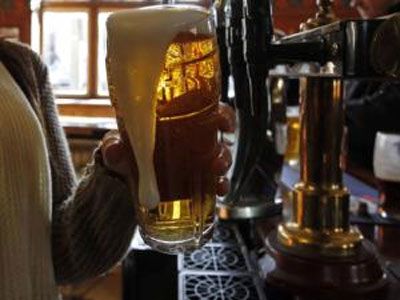Through the past decade, Bihar’s revenue from liquor has quadrupled
 Whenever he visits his company’s brewery and packaging plant 39 km from Patna, Karan Bilimoria, deputy lieutenant of Greater London and founder of Cobra Beer, is fond of mentioning the fact that his father was a serving officer in the neighbouring Danapur cantonment. While that helps remind everybody about his ‘Bihar connection’, Bilimoria and his peers in the state’s liquor industry know they have to learn to live with the political minefield.
Whenever he visits his company’s brewery and packaging plant 39 km from Patna, Karan Bilimoria, deputy lieutenant of Greater London and founder of Cobra Beer, is fond of mentioning the fact that his father was a serving officer in the neighbouring Danapur cantonment. While that helps remind everybody about his ‘Bihar connection’, Bilimoria and his peers in the state’s liquor industry know they have to learn to live with the political minefield.
When Bilimoria set up shop in Bihar in 2008, several eyebrows were raised. Today, the unit is so profitable that the company is slated to scale up production from 500,000 cases a month to 700,000 cases by 2016. And, the company, a joint venture with Molson Coors, is the fourth-largest beer manufacturer in the world.
Through the past decade, Bihar’s revenue from liquor has quadrupled, hitting Rs 20,000 crore (Rs 200 billion) this year. In election season, amid protests by locals over the easy availability of liquor, the Nitish Kumar government in the state, along with several political parties, have had to astutely recalibrate their position on liquor.
A single-lane road connects Bihta to Patna and its airport. “It used to be worse when we first came in,” says a member of the senior management at Cobra Beer. The poor state of the road is despite the fact that besides the Cobra Beer facility, two other breweries, of United Breweries and Carlsberg, are also located on the same stretch of the Danapur-Khagaul road.
The completely mechanised Cobra Beer brewery is availing of a favourable liquor policy unveiled by the Kumar-led government, as well as uninterrupted power supply.
“Beer brewing is an extremely power-intensive process; it needs to be fermented in tanks at zero degree centigrade for 15 days. Uninterrupted power is essential. Thankfully, we have never had to operate our generator sets here,” says the Cobra Beer official.
It was with an intention to attract investment that the Bharatiya Janata Party (BJP)’s Sushil Kumar Modi, former finance minister of the state, had unveiled Bihar’s new liquor policy. However, in a volte-face, the BJP, a former coalition partner in the government, has now spoken out against the relaxed policy.
The incentivised liquor policy has ensured even as the beer market grows about 10 per cent a year in India, the growth in Bihar is 30 per cent.
The Cobra Beer unit produces the premium Carling brand, as well as the Iceberg 9000, the Thunderbolt and the more popular Cobra Beer for the local market. As it can sell to the Bihar State Beverages Corporation alone, maintaining cordial relations with the state government and the bureaucracy is vital.
But the going may not be smooth.
Of late, villagers, especially women, have taken to the streets, demanding a stop to the proliferating liquor stores. Ramashree Devi, 50, from Rana Bigha, speaks out against the liquor shops in the vicinity. “I lost my husband to liquor 10 years ago and now, I don’t want to see young lives snuffed out with easily available liquor.” Along with other women from surrounding villages, she has led a protest march, blocking a highway.
Confronted by attacks from both locals and political opponents, Kumar has promised to restrict opening of liquor shops in villages.
Though Cobra Beer claims it will be unaffected by any change in the political leadership, insiders admit since the Janata Dal (United) parted ways with the BJP, the management has been maintaining a distance from both parties. Bilimoria, “a friend” of Kumar, has stopped dropping by at the state secretariat during his annual visits to Patna.
The story is no different for the few industries operating across the state, with industrialists closely tracking the polls. Acquiring land continues to be a major roadblock to industrialisation in Bihar; United Breweries, which was allotted land, is now facing problems securing possession.
Low literacy levels and unskilled labour pose additional challenges for even a plant as automated as the Cobra Beer unit.
The Rashtriya Janata Dal’s Bhai Birendra, the current MLA from Bihta, says, “The chief minister has stated liquor shops will be restricted in villages. The government’s policy will remain unchanged in urban areas.” On the fallout of such a policy on the state exchequer, he says, “We will look at other revenue-generating options.”







